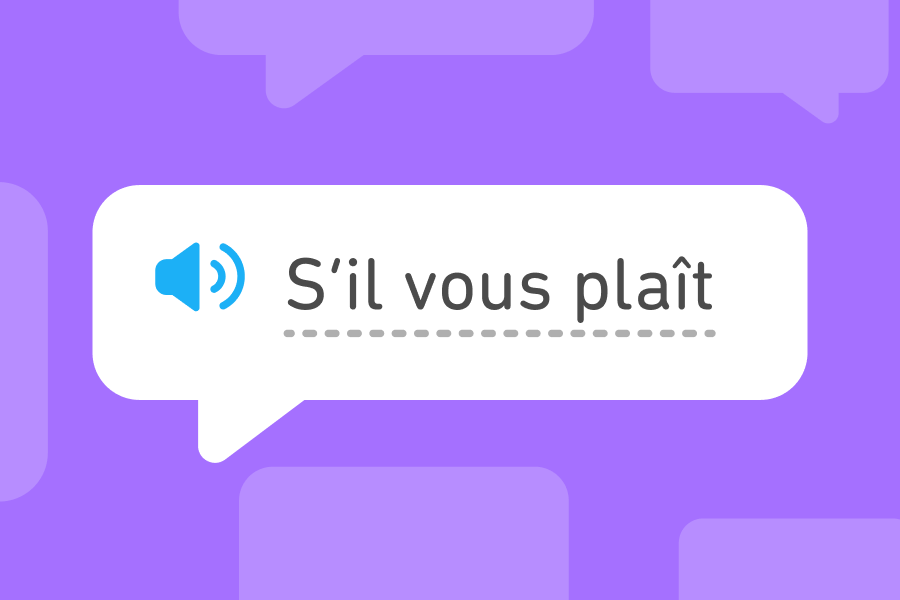Putting your thoughts together in a different language can be daunting. But with a few go-to words you can better tackle different situations in your new language. Here are some new ways to use common French phrases—you'll soon be using French like a local!
Bonjour
This essential greeting means more than just “good day”—use it to acknowledge someone before every interaction!
Use it to: express greetings and acknowledgements, make introductions
Examples:
- Bonjour ! Comment allez-vous ? (Hello! How are you?)
- Oui, bonjour ! (Yes, hello!)
- Bonjour, Madame. (Hello, ma’am.)
- Bonjour, c’est moi. (Hello, it’s me.)
But wait, there’s more! Entire books have been written on the importance of making sure to say bonjour at the beginning of any interaction! It serves as an opportunity to acknowledge the person you're talking to and for them to acknowledge you back. Always start with Bonjour ! and let the conversation flow from there!
S’il vous plaît
This is the complicated-looking, three-syllable French phrase to say “please.” (There is also an informal version, s’il te plaît.)
Use it to: make requests, express yourself politely
Examples:
- Un café crème, s’il vous plaît. (A coffee with cream, please.)
- S’il vous plaît, excusez-moi. (Please, excuse me.)
- Oui, s’il vous plaît. (Yes, please.)
- Celui-là, s’il vous plaît. (That one, please.)
But wait, there’s more! S’il vous plaît has been adopted in English in the acronym RSVP, which stands for répondez s’il vous plaît (respond please). S’il vous plaît literally means "if it pleases you" and uses an indirect object pronoun (vous or te). You can even use it by itself when trying to get someone’s attention: S’il vous plaît ! (Ahem!)
Moi aussi
This useful phrase can help you express agreement or consensus, and it literally means "me too."
Use it to: respond to requests, share your opinion or preference
Examples:
- Oui, moi aussi, j’y vais. (Yes, I’m leaving as well.)
- Vous aimez le chocolat ? Moi aussi ! (Do you like chocolate? Me too!)
- Mon frère déteste ce fromage, et moi aussi. (My brother hates that cheese, and me too!)
- Un verre de vin pour moi aussi. (A glass of wine for me as well.)
But wait, there’s more! This phrase uses the stressed pronoun moi. This category of pronouns is used in French after prepositions (like in pour moi, "for me"), in affirmative commands (Regarde-moi ! "Look at me!), and to show emphasis (Moi, je préfère l'éte, "Me, I prefer summer"). Some other pronouns in this category are toi (you), lui (him), and eux (them)—so you can also say toi aussi (you too), lui aussi (him too), and eux aussi (them too)!
Maintenant
This word can seem intimidatingly long (and nasal!), but it's actually very useful in everyday conversation to say “now.”
Use it to: refer to time in the present moment
Examples:
- Le cours commence maintenant. (The class is beginning now.)
- Maintenant, s’il vous plaît. (Now, please.)
- Je préfère le faire maintenant. (I prefer to do it now.)
- On y va maintenant ! (Let’s go now!)
But wait, there’s more! When speaking slowly, with careful pronunciation, or to emphasize what you're saying, maintenant is pronounced with three syllables: main-te-nant. But in quick, everyday conversation, you’ll often hear it pronounced with just two: maint-nant. The unstressed “e” in the middle of the word is sometimes referred to as a schwa or e muet (mute e) and is skipped over in certain words and contexts.
Au revoir… for maintenant !
Use these words to start finding your confidence in French! You can find more ways to use them as you spot them in your Duolingo lessons. And as always, stay tuned for more blog posts to maximize your français!
